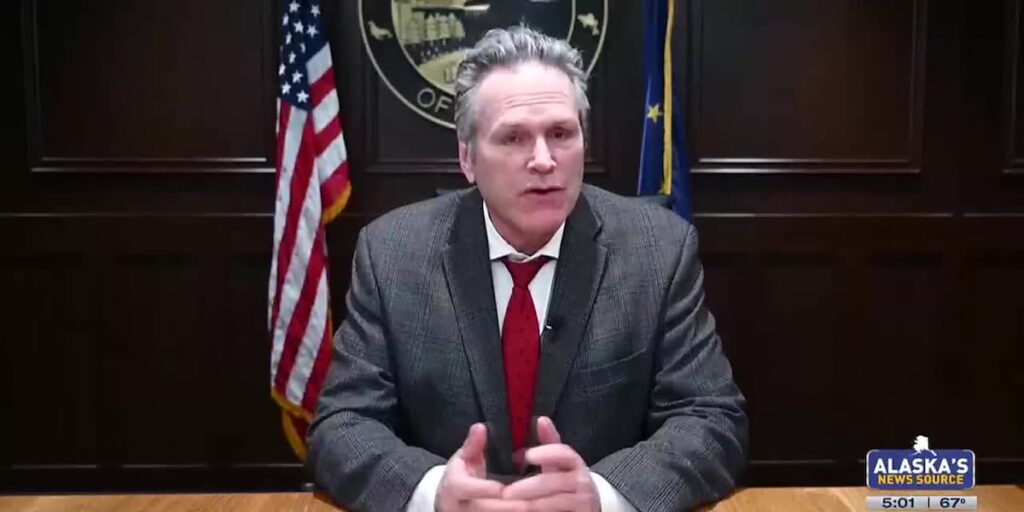ANCHORAGE, Alaska (KTUU) – A nonprofit is planning to sue the state of Alaska over what they claim are constitutional violations Gov. Mike Dunleavy’s nearly $51 million education funding veto created, their director confirmed to Alaska’s News Source Wednesday.
“We feel that litigation is the only path forward,” said Caroline Storm, executive director of the Coalition for Education Equity of Alaska.
That lawsuit threat comes as most legislators have all but dismissed the possibility of an emergency special session. Included in their reasoning, the governor’s separate veto of funding for a special session and not being able to get the 45 votes needed for an override.
The growing feeling, multiple lawmakers say, means educators’ and superintendents’ best shot for funding will not be until the next legislative session starts in January 2026. With almost seven months until that date, education advocates feel suing is now their only option.
The potential lawsuit, Storm said, aims to argue the governor’s veto on education funding is unconstitutional because it would not fund “adequate” education. She pointed to a lawsuit in 2004, filed by the coalition when they were under a different name, where the judge listed what adequate education was.
“Defined by Judge [Sharon] Gleason … adequacy is giving children the reasonable opportunity to learn and meet the standards set by the state,” she said.
In that case, Moore v. State of Alaska, the state settled after eight years of litigation, paying $18 million “for the lowest performing schools,” according to a 2012 press release from the governor’s office.
The coalition uses the same language in Alaska’s constitution on its website explaining the case, saying the legislature “shall by general law establish and maintain a system of public schools open to all children of the State.”
“I think we’re getting dangerously close to the point where we’re not meeting our constitutional obligation to establish and maintain a system of public education,” Sen. Bill Wielechowski, D-Anchorage, said Tuesday. “There have been multiple lawsuits over the years where the courts have been very clear that the legislature has a constitutional obligation to fund education.”
Alaska’s News Source reached out to the governor for an interview earlier this week, but a spokesperson said he would be unavailable all week. A spokesperson for the attorney general said they “have not received word of the lawsuit yet.”
“As part of the process, we will be scrutinizing every aspect of the budget, every line out of the budget, and we are going to make sure that those things that are absolutely necessary will be in the budget. And those things that we can live without, at least for a little while, will probably be removed,” Dunleavy said in a video last week.
Storm said she received commitments from potential plaintiffs for a suit, but did not say who those parties are.
“I know there are school districts that are looking at filing a lawsuit,” Wielechowski added. “I know that there are outside of the organizations education groups that are looking at filing a lawsuit, so you know this is all resolved if we go in and override it and I look forward to voting to override it when we eventually do get there.”
Leaders from multiple school districts and political parties have begun predicting what they categorize as dire consequences would immediately have on the state’s 53 school districts, as they begin to balance — in some cases — millions of dollars’ worth of deficits. At least five have already implemented hiring freezes.
“The district-wide impact of the governor’s vetoes from our approved budget is $7.1 million,” Public Information Officer for the Mat-Su Borough School District, John Notestine, said in an email Monday.
Madeline Aguillard, superintendent of the Kuspuk School District, located in Aniak, said their district is facing a $2.4 million deficit, an amount she said Monday could “lead to us not being functional.”
“Worst case scenario for us, we’d have to cut funding for sports. I mean, that’s kind of horrifying,” Superintendent of Nome Public Schools Jamie Burgess, a leadership member of the Coalition for Education Equity, said Monday.
Storm said the coalition is prepared to file soon.
Alaska’s News Source reached out to all members of the House and Senate Education committees Wednesday.
Sen. Mike Shower, R-Wasilla, said he found any potential lawsuit “a waste of time.
“I am not a fan of the — what are generally frivolous lawsuits and lawfare we see far too much of in today’s politics,” Shower said. “In this case, the governor is well within his rights as defined by our constitution and statutes to line-item veto.
“If people don’t like his vetoes then the right answer is ask your legislators to exercise a veto override next time we are in session. Quit shortcutting the system and do it the right way.”
Rep. Maxine Dibert, D-Fairbanks, said she could not comment on active or potential litigation, other than she wouldn’t be surprised to see something move forward.
“It doesn’t surprise me that local municipalities and nonprofits are seriously considering legal action, asserting that the state — through this recent veto — may be falling short of its constitutional obligation to fund public education,” she said.
Several members of the minority Republican caucuses in both the state House and Senate have also not returned requests for comment.
The governor’s office continues to say Dunleavy is unavailable for an interview this week.
See a spelling or grammar error? Report it to web@ktuu.com
Copyright 2025 KTUU. All rights reserved.

